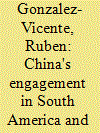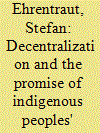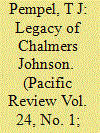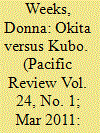| Srl | Item |
| 1 |
ID:
102676


|
|
|
| 2 |
ID:
102681


|
|
|
|
|
| Publication |
2011.
|
| Summary/Abstract |
China's engagement in South America and Africa's extractive sectors has increased significantly in the last decade. How comparable are the African and South American cases from a developmental perspective? This article explores resource curse theories, arguing that the 'curses' often associated to extraction are historically produced dynamic processes that need to be reevaluated in light of China's direct and indirect impacts on resource-endowed countries. It elaborates a framework to compare the developmental dynamics entailed by China's involvement in the South American and African extractive sectors, distinguishing between external, internal and intrinsic 'curses'. The article holds that China's growth and investment have strengthened the position of resource-endowed countries in the international economy, revitalizing resource industries and improving terms of trade for commodities. Concurrently, the expansion of extractive activities has brought about increased environmental and economic sustainability challenges. Divergences between the African and South American cases are best observed at the national levels, where China's non-interventionist approach has different developmental implications depending on internal trends within investment host countries.
|
|
|
|
|
|
|
|
|
|
|
|
|
|
|
|
| 3 |
ID:
102682


|
|
|
|
|
| Publication |
2011.
|
| Summary/Abstract |
Indigenous peoples' rights, including the right to self-determination, are increasingly codified in international law and policy and disseminated globally by international organizations. These norms mark a profound change in the ideals of citizenship promoted by the international community, away from linguistically and institutionally homogenous citizenship in centralized states to group-differentiated citizenship in decentralized, multi-level and multi-lingual states that use local and regional autonomy for the accommodation of indigenous peoples. Essential to realizing these norms is the devolution of some degree of autonomy to sub-central state units substantially controlled by indigenous communities. Because the transfer of powers to indigenous peoples is crucial to their accommodation, protection and participation in modern states, and because decentralization programs are an important component of reform agendas in most developing countries, it is important to understand how these emerging norms are integrated into real-world decentralization processes.
This article analyzes the application of the World Bank's safeguards policy for indigenous peoples within the institution's support to decentralization reform in Cambodia. The analysis demonstrates that under certain circumstances, the policy not only fails to translate into effective protection but leads to outcomes diametrically opposed to its objectives. In its current design, Bank support to decentralization contributes to the marginalization of indigenous peoples in Cambodia and undermines the institutional, cultural and natural resources upon which their empowerment and participation depends. In environments in which full compliance might be unrealistic to accomplish by individual projects, safeguard obligations lead to a strategy on the part of Bank projects of avoiding geographical and policy areas that are likely to trigger the safeguards policy, in order to reduce projects' vulnerability to non-compliance claims. The article discusses how more effective application of the safeguards policy might be achieved and how strategies for the empowerment of indigenous peoples can more effectively draw on decentralization frameworks.
|
|
|
|
|
|
|
|
|
|
|
|
|
|
|
|
| 4 |
ID:
102683


|
|
|
|
|
| Publication |
2011.
|
| Summary/Abstract |
Many actors involved in peacebuilding and statebuilding are acutely aware of the different roles of the 'local' in peacebuilding. Increasingly, this realisation has opened up tensions between the liberal peace and the realm of customary forms of politics and social structure. Peacebuilding may now be seen as a site of international assistance and local acquiescence, co-option or resistance. To understand these dynamics, the 'infrapolitics of peacebuilding' need to be uncovered. This article presents these dynamics in the cases of Timor Leste and the Solomon islands.
|
|
|
|
|
|
|
|
|
|
|
|
|
|
|
|
| 5 |
ID:
102678


|
|
|
| 6 |
ID:
102677


|
|
|
| 7 |
ID:
102680


|
|
|
| 8 |
ID:
102679


|
|
|
|
|
| Publication |
2011.
|
| Summary/Abstract |
In recent years, there has been an increasingly vigorous debate by a wide range of participants over the past, present and future of Japanese security and the national defence policy. Ever since the end of the Cold War, international relations theorists have cast their gaze to Japan, and have been given to re-examining 'comprehensive security' with a particular eye for the meaning of 'security'. The 1990s were a particularly interesting time for this scholarly revisionism, while events of September 2001 have cast an entirely different spectre on the nature and expectations of Japanese security, both domestically and internationally. This article is particularly concerned with the developments in the 1990s as scholars sought to reassert the 'defence' component of the comprehensive security policy hitherto pursued by Japan. This re-examination has elevated former Japanese Defence Agency (JDA) bureaucrat Kubo Takuya as the key architect in crafting Japan's security policy. Tsuyoshi Kawasaki's contributions to the debate are especially interesting on this point. He rightly challenges the short-comings of the so-called 'domestic-constructivists', especially Berger and Katzenstein. However, in attempting to demolish their cases for 'selective biases' he then proceeds to selectively argue a similarly biased case in asserting the superiority of yet another derivation of the realist cause - 'postclassical realism'. His key premises are based on his interpretations of the architect of Japan's National Defence Program Outline, Kubo, and in doing so 'proves' the military aspect of Japan's security policy and its 'inherent superiority' as an explanatory framework. Equally, one can mount a case for the 'comprehensive security' proponents by citing the work and presence of the late Okita Saburo in his contributions to understanding post-war security policy. This article will demonstrate a similar argument to that of Kawasaki's based on an analogous analytical framework which grounds Japanese security consciousness in a deeper historical context. It is part of a larger project which seeks to give empirical substance to constructivist interpretations of Japanese security.
|
|
|
|
|
|
|
|
|
|
|
|
|
|
|
|